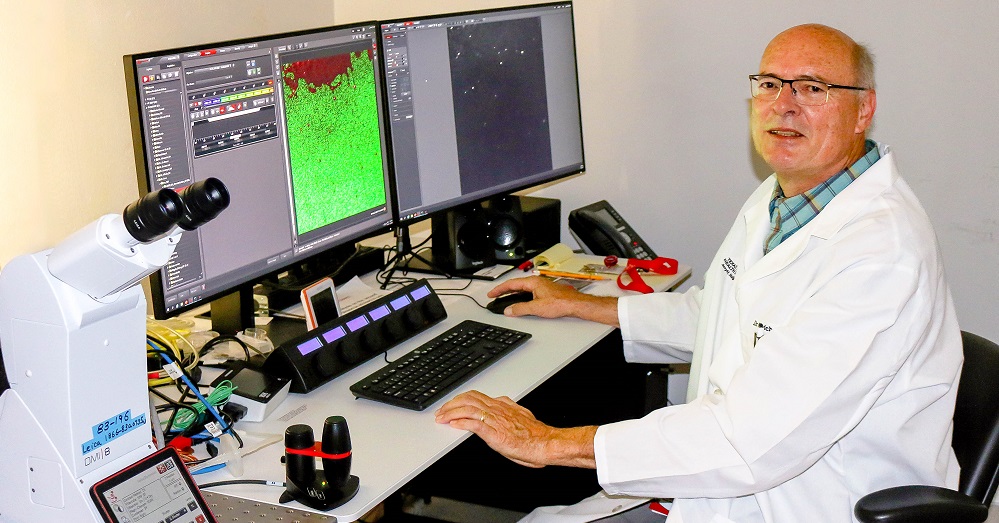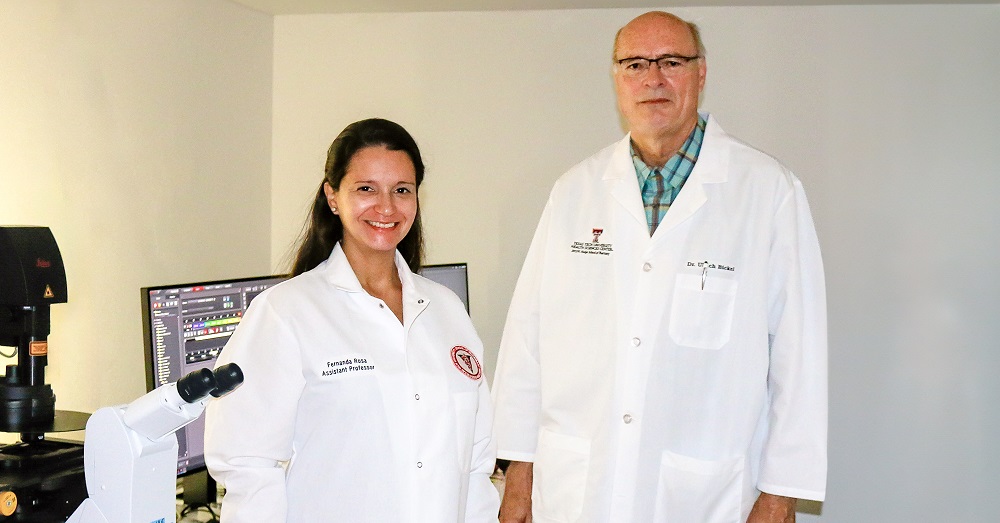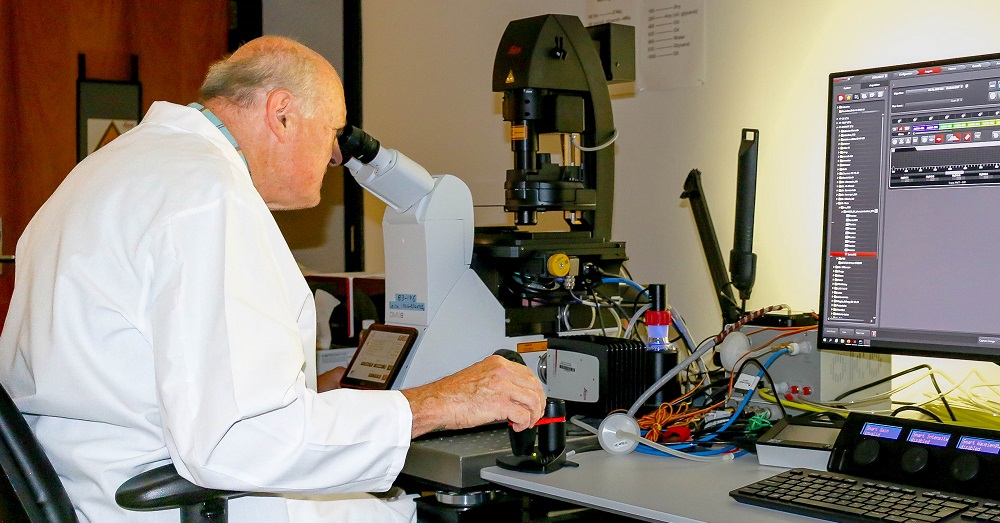Rare Microscope Brings New Opportunities to TTUHSC
USDA Subcontract Could be First of Many Collaborations with TTU Vet School

Ulrich Bickel, M.D.
In its August 2020 funding cycle, the Cancer Prevention & Research Institute of Texas (CPRIT) awarded a $2.8 million Core Facility Support grant to Ulrich Bickel, M.D., professor and associate dean of sciences in the Texas Tech University Health Sciences Center (TTUHSC) Jerry H. Hodge School of Pharmacy.
The grant funded the purchase of three new imaging instruments that, when combined with existing equipment, transformed the Amarillo campus Imaging Core Facility into a state-of-the-art imaging center and amplified TTUHSC’s intention to become a competitive biomedical research institution.
The featured piece of equipment purchased with the grant was a Leica Stellaris 8 Falcon STED Super resolution confocal microscope. This unique and rare microscope system allows investigators to produce optical images of living cells at a resolution previously achievable only by electron microscopy. The inventors received a Nobel Prize in 2014.
A human red blood cell has an average diameter of seven micrometers, which can be seen using a normal optical microscope. Other cells and organisms measuring one micrometer in diameter, including certain bacteria, are harder to see with an optical microscope, but it is possible. However, there are certain things that are so small — 30 to 50 nanometers, for example — and cannot not be seen with a typical optical microscope.

Ulrich Bickel, M.D. and Fernanda Trindade da Rosa, Ph.D.
Bickel said the Leica Stellaris 8 Falcon STED Super resolution confocal microscope helped eliminate those restrictions. When casually viewed, this microscope generally looks similar to any other. But the primary difference is a box of three drawers that sits on the left of the microscope. Each of these drawers contains very strong lasers of different wavelengths.
“A normal confocal microscope scans lines of the image and it has the normal resolution,” Bickel explained. “But because of diffraction, any little dot that goes through the lens will not appear as just a dot, but will have some small rings around it. These lasers delete those rings so that only the center shines through. The entire microscope has to be very finely tuned, of course, and I still struggle with understanding how that can work because 30 nanometers is so small. You would think someone just walking in the room would lead to some vibration that throws it off, but somehow it doesn’t.”
The Leica Stellaris 8 Falcon STED Super resolution confocal microscope is such a rare piece of equipment that TTUHSC’s is one of just four in operation across the country. Bickel said researchers on the Amarillo campus use it daily from morning to night, and researchers from TTUHSC’s Abilene campus also are traveling more frequently to Amarillo to use the microscope. At the current rate of usage, Bickel expects the microscope will be used up to 1,300 hours during 2023.

Ulrich Bickel, M.D.
Some of those hours will be logged by Bickel himself. The United States Department of Agriculture recently awarded a grant to Fernanda Trindade da Rosa, Ph.D., from the Texas Tech University (TTU) School of Veterinary Medicine. Bickel will work on the grant as a subcontractor.
For her study, Rosa will investigate how microRNAs (miRNAs) found in bovine colostrum (the very first milk that a cow feeds her calf) affects the ability of calves to fight infection during their first few weeks of life when their immune systems are most vulnerable. Gastrointestinal infections are one of the primary causes of death for several weeks after birth. Rosa’s hypothesis is that miRNAs, when they are in the gut of these calves, can modulate the immune response to infections.
Most of these miRNAs are found in natural liposomes known as extracellular vesicles. They are secreted from the cells in very small blocks that typically measure between 30 nanometers and one micrometer.
“With this grant, one aim is to use our super resolution confocal microscope to look at these miRNAs — these extracellular vesicles to be more precise — and label them with florescent dyes,” Bickel said. “We want to see when they are taken up by the epithelial cells (cells that line the inner and outer surfaces of certain areas of the body) in the gut and how they act.”
Bickel believes acquiring the Leica Stellaris 8 Falcon STED Super resolution confocal microscope represents a significant success story for TTUHSC, even before this latest collaborative subcontract with Rosa and TTU’s veterinary school. He said it was all due to the application he submitted to CPRIT that included the CVs of many TTUHSC investigators and descriptions of their ongoing research that would benefit from the microscope.
“I'm happy that we can make use of the instrument and showcase and expand the possibilities of collaboration with our vet school colleagues,” Bickel added. “This is hopefully just the beginning of many collaborative grants in the future.”
Related Stories
TTUHSC Cancer Researcher Honored by National Academy of Inventors
C. Patrick Reynolds, M.D., Ph.D., director of the School of Medicine Pediatric Cancer Research Center at TTUHSC, has dedicated his life as a researcher to developing treatments for childhood cancers.
TTUHSC’s Hudson Set to Serve as President for Society of Clinical Research Associates
The Society of Clinical Research Associates (SOCRA) has elected Texas Tech University Health Sciences Center’s (TTUHSC) Catherine Hudson, Dr.P.H., as its president for 2025-2026.
Clinical Research Institute a Source of Pride for Retiring Griswold
Upon his retirement, John Griswold, M.D., reflects on the Clinical Research Institute and what it has achieved.
Recent Stories
The John Wayne Cancer Foundation Surgical Oncology Fellowship Program at Texas Tech University Health Sciences Center Announced
TTUHSC is collaborating with the John Wayne Cancer Foundation and has established the Big Cure Endowment, which supports the university’s efforts to reduce cancer incidence and increase survivability of people in rural and underserved areas.
TTUHSC Receives $1 Million Gift from Amarillo National Bank to Expand and Enhance Pediatric Care in the Panhandle
TTUHSC School of Medicine leaders accepted a $1 million philanthropic gift from Amarillo National Bank on Tuesday (Feb. 10), marking a transformational investment in pediatric care for the Texas Panhandle.
Texas Tech University Health Sciences Center Permian Basin Announces Pediatric Residency Program Gift
TTUHSC Permian Basin, along with the Permian Strategic Partnership and the Scharbauer Foundation, Feb. 5 announced a gift that will fund a new pediatric residency.
